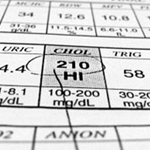Are Home Medical Tests Worthwhile?
What do you think of do-it-yourself cholesterol tests? What about C-reactive protein home tests?
Andrew Weil, M.D. | March 11, 2011

Do-it-yourself medical testing is becoming increasingly popular as patients shy away from the costs of seeing a physician and the time involved. The Wall Street Journal reported in January, 2011, that home testing is now a $20 million business. (If you include home genetic testing, which I think is ill advised, the market approaches $100 million per year.)
The FDA has approved many do-it-yourself cholesterol tests as well as other medical tests you can perform at home. Some, like pregnancy tests, are fairly reliable if you carefully follow directions. But I’m not sure about home cholesterol testing. Some of the products measure only total cholesterol, which won’t give you a true picture of your risk of heart disease. Some give you more information – your HDL ("good" cholesterol) level, LDL ("bad" cholesterol), and triglycerides (blood fats). But the more comprehensive tests are much more expensive (more than $100) than those that measure only total cholesterol (as little as $15 or less), and you may need medical guidance on how to interpret the results and what, if anything, you should do about them.
C-reactive protein (CRP) is a blood marker for inflammation in the body. High levels of CRP are associated with an increased risk of heart disease. If you’re testing at home, you should be aware that CRP test results can be affected by birth control pills, statin drugs used to treat high cholesterol, and non-steroidal anti-inflammatory drugs including ibuprofen (Advil, Motrin) and acetaminophen (Tylenol). Results have to be interpreted within the context of all of your risks of heart disease – something that’s worth a discussion with your doctor.
If you are tempted to use any do-it-yourself tests, check online to make sure that the labs involved are certified by the federal Clinical Laboratory Improvement Amendments and accredited by the College of American Pathologists. If not, I would stay away. I would also advise passing up any testing service that also sells treatments for whatever disease or condition its tests are designed to diagnose.
Andrew Weil, M.D.
Learn more: Dr. Weil’s Personal Heart Health









